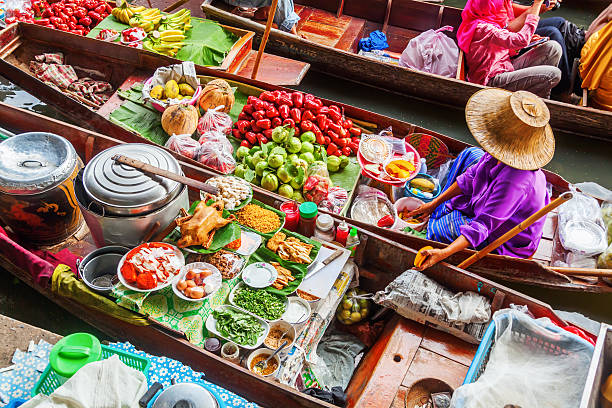Title: The Impact of Thai Culture on Well-Being and Healthy Lifestyle In order to achieve comprehensive well-being, we must consider the influence that culture has on our health. Thai culture, with its diverse customs, food, and wellness practices, provides a wealth of knowledge about leading a healthy lifestyle. Let’s explore how Thai culture affects wellbeing and a healthy lifestyle.
Thai food is well known for its flavorful combinations, fragrant spices, and fresh ingredients. The Thai approach to nutrition is shown in the emphasis on moderation, diversity, and balance. Thai cuisine offers a showcase for nutritious herbs like lemongrass, galangal, and turmeric, which are known for their anti-inflammatory and antioxidant qualities. Dishes like hot and sour tom yum soup or aromatic green curry also feature these nutrients.
Moreover, Thai culture places a high value on group dining, which encourages attentive eating and social interaction. People who engage in this practice are more inclined to eat mindfully since they are encouraged to enjoy every meal. In addition to fostering a sense of community, eating meals together also improves emotional health.
Thai culture goes beyond food; it also includes ancient medical practices like herbal treatments and Thai massage. Thai massage seeks to balance the body by concentrating on acupressure points and energy routes. Furthermore, for millennia, people have used herbal treatments that include native plants like turmeric and ginger to treat a variety of illnesses.
Furthermore, Thailand has a strong cultural foundation in mindfulness and meditation, which is demonstrated by the abundance of meditation retreats and the calm atmosphere of its temples. The focus on mental health serves as a reminder of the body, mind, and spirit’s interdependence in attaining total health.
Through ancient martial arts like Muay Thai and cultural dances like traditional Thai classical dance, the Thai way of life also promotes physical activity. In addition to improving physical fitness, these activities foster a sense of pride and kinship with one’s Thai cultural background.
Furthermore, the celebration of seasonal holidays like Songkran (Thai New Year) and Loy Krathong (Festival of Lights) as well as the extensive use of natural materials in traditional construction demonstrate Thai culture’s regard for environment. These celebrations promote an environmentally responsible way of living by highlighting the symbiotic interaction between humans and the natural world.
People all around the world can be motivated to incorporate aspects of Thai culture into their own life by realizing the positive effects of Thai culture on wellbeing and healthy living. There are many lessons to be learned from the Thai approach to well-being, whether it is through mindful eating, holistic healing techniques, or embracing physical exercise and connection to nature.
In summary, Thai culture has a profound impact on wellbeing and healthy living that cuts across national boundaries and offers timeless wisdom that is in line with the goal of holistic wellness. We may improve our lives and foster a stronger sense of harmony, vibrancy, and interconnectedness with the world around us by embracing the spirit of Thai traditions. Let’s be inspired by Thailand’s rich cultural heritage to develop a way of living that promotes long-term health and wellbeing.


